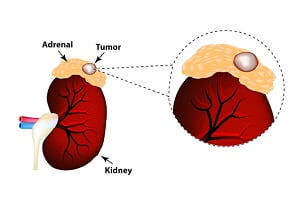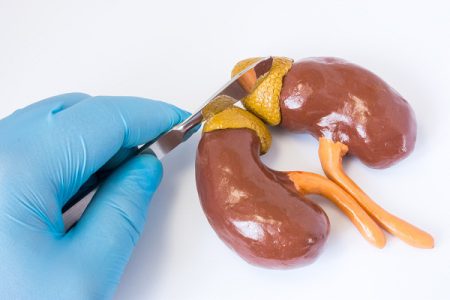Adrenal cancer begins with the cells of one or both of the small, triangular glands (adrenal glands) located on the top of kidneys. This cancer is also known as adrenocortical cancer which can occur at any stage of life. Most likely it affects children younger than 5 and adults in their 40s and 50s. Mutations in the DNA of an adrenal gland cause adrenal cancer.
Adrenal cancer treatment generally involves adrenal gland surgery. Medications can also be provided to prevent the cancer reoccurrence if surgery isn’t an option.
What is Adrenal Cancer Surgery (Adrenalectomy)?
Surgical removal of adrenal gland is called adrenalectomy. It is the best choice to cure adrenal cancer. Nearby lymph nodes and tissues may also be removed during this surgery. In some cases surgeons remove tumors that may have spread to other parts of the body.
Types of Adrenal Cancer Surgery
Adrenal gland can be removed in two ways:
Open Surgery
Open surgery is the traditional method of adrenalectomy. This process involves making a large incision in the skin under the right or left rib cage or the ribcage midline.
- In case of small tumors, incision may be made in the back, just below the ribs.
- In cases of large cancers, incision is made in front of the belly. This is a more common practice because it would be easier to see the adrenal gland and tissues around it. Doctors can find and remove the areas of cancer. It makes easy for doctors to reach both adrenal glands through a single incision.
Disadvantage of Open Surgery
More pain, longer hospital stays and a higher rate of complications like bleeding, wound infections and abscess formation are associated with open surgery.
Laparoscopic surgery
This is a type of surgery in which a doctor operates within the abdominal cavity with small telescopes and long instruments. It is done for small tumors by making several small incisions (approximately 1/4 to 3/4 inch) with specialized instruments.
Air fills into the abdominal cavity to blow up like a balloon under modest pressure by one of these instruments. This process makes easier to work since other nearby organs will fall away from the tissues which are being operated.
A camera is then installed into the place of abdominal cavity so that doctor can see the area on the computer screen. Long and thin instruments (forceps, scissors, etc) are placed into the other incision for the actual dissection of tissues.
Who are the Best Candidates for Laparoscopic Adrenalectomy?
- Tumors larger than 10 cm in diameter are more likely to be cancerous and therefore they require more exposure and aggressive surgery.
- Tumors which secrete hormones are ideally suited for this approach.
- Tumors which arise from the central zone of the adrenal gland (medulla) and secrete adrenaline are called pheochromocytomas. They are generally small and benign and can be removed precisely by using this technique.
What Complications can Occur During Adrenal Cancer Surgery?
As with any surgery, there is risk of complication with adrenal gland removal. Complications during this surgery may include:
- general anesthesia reaction
- high blood pressure
- increased bleeding
- blood clots
- heart attacks
- wound problems
- injury to other organs.
What Happens After Adrenal Cancer Surgery?
After the adrenal cancer surgery (adrenalectomy) is complete, it is important to follow your doctor’s instructions. Body needs time to heal for better recovery.
- After adrenalectomy, most patients require admission to intensive care unit to monitor their blood pressure. Most patients are discharged from the hospital within two or three days after the operation.
- Patients with an aldosterone-producing tumor need to get checked their serum potassium levels after adrenalectomy. They may be asked to continue medications to control blood pressure.
- Patients who have cortisol-producing tumor will need to take medicines like prednisone or cortisol pills after surgery.
- Patients can perform normal activities within one week like walking, light lifting, work, etc.
- Patients should take an appointment of the doctor after 2-3 weeks of the surgery.






